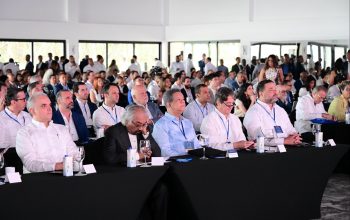news
GFDD and FUNGLODE Contribute to a Successful 65th Annual NGO DPI Conference
August 29, 2014
Friday August 29th 2014, marked the end of the 65th Annual UN Department of Public Information/Non-Governmental Organization Conference (the Conference), a three day conference which started on Wednesday August 27th.
The conference aimed to provide an opportunity for civil society, international networks and activists to develop an action agenda to mobilize messaging, advocacy strategies, partnerships and accountability frameworks in the lead up to the
assemble for the adoption of the post-2015 development agenda.
GFDD and FUNGLODE were a visible presence throughout the Conference, as they hosted a temporary display in the exhibitor’s lounge for ReCrearte (http://www.r3crearte.org/) , one of their landmark environmental initiatives, and co-sponsored a panel discussion and workshop organized by the United Nations Association of the U.S.A. (UNA-USA)- Council of Organizations on the topic of “Antibiotic Resistance and Obsolescence: Meeting the Major Infectious Disease Challenge for Post-2015”.
ReCrearte Exhibit
Engaging Dominican communities into reformulating the way they think about trash, the ReCrearte program promotes the three golden rules of proper waste management: Reduce, Reuse and Recycle, while enriching these communities with new skills that can potentially generate income for personal use and for support of their families. The exhibit, which sought to demonstrate the social and economic benefits of environmental
sustainability, was very well received by the Conference participants. It displayed a selection of objects produced by the 2014 ReCrearte workshop participants (trained by the manager of the workshops, Ms. Bertha Santana) and made from household items such as discarded clothing, cardboard and plastic bottles. The objects exhibited included hair accessories inspired by flowers, bags and purses. These helped to show Conference participants how this grassroots recycled art project could serve
as a model development initiative, helping to protect the environment, grow the local economy and empower women communities.
Workshop and exhibit
GFDD and FUNGLODE also sponsored UNA USA’s workshop on antibiotic resistance, that took place on Thursday afternoon. It aimed to raise awareness among attendees about the global antibiotic crisis which is a severe challenge to the success of the Millennium Development Goals and an impediment to attaining global health goals which need to be part of the post-2015 Sustainable Development Agenda. As part of this challenge a related Exhibit in the NGO Information-Sharing and Exhibition Centre was held to demonstrate globally-accessible soil sampling and analysis techniques for identifying potential antibiotics as part of an international
educational program.
The workshop was moderated by H.E. Ambassador John E. Lange, Senior Fellow of Global health and Diplomacy, United Nations Foundation and included on its panel of speakers several notable figures in the medical field, including World Health Organization (WHO) representative Dr. Pilar Ramon-Pardo, Regional Advisor on Clinical Management of Infectious Diseases and Antimicrobial Resistance Surveillance at the Pan
American Health Organization and Dr. May C. Chu, Assistant Director of Public Health in the Office for Science and Technology Policy (OSTP)/Executive Office of the President of the United States.
Award winning filmmaker and performance artist, Ms. Josephine Decker, opened the discussion with an interpretative dance about the dual nature of antibiotics– as healer and as destroyer. The performance itself used techniques of Butoh
dancing and performance art to alternate between the two extremes of healing and destruction. The dance offered an original opening to this important discussion, which was received to great acclaim by attendees.
The discussion that ensued included some important messages on the struggles encountered by the medical community in creating antibiotics that can fight the global diseases that threaten human beings. Indeed illustrating this point, Dr. Eric A.
Utt, Director in the Pfizer Global Policy Center of Excellence, commented on the increasingly difficult short life cycle of these drugs which practically become obsolete from the moment they are designed. He explained that this was due to the fact that bacteria have a 2.5 billion year head start in terms of developing bacterial resistance to each antibiotic designed by man.
Dr. Pilar Ramon-Pardo stressed that in an effort to overcome the
outbreak of global diseases such as the current Ebola crisis that originated in Nigeria, the WHO is actively looking to develop a global action plan to fight antimicrobial resistance. She pointed out that the action plan is currently open for consultation and observations by member of the public until 1 September 2014 on the WHO website.
Ambassador Lange concluded the
session by stressing the importance on pushing for the development of novel techniques to achieve effective antibiotics and in that regard urged the attendees of the workshop to also attend the exhibit located in the NGO Information-Sharing and Exhibition Centre.
Summary of Meetings throughout the Conference
The three day conference was a melting pot for civil society, which included attendees from over 117 countries. The workshops and roundtables of the Conference tackled multiple topics listed on the Post 2015 Development Agenda including the issue of poverty eradication, facilitating a transition to clean technology and even the future dynamics between the development agenda and the UN’s climate change process (particularly as the fast
approaching Climate Summit and the UNFCCC negotiations towards an international climate agreement loom on the horizon).
The Declaration
The overall feeling from Conference attendees was a positive one, resulting in a bold Conference Declaration (the Declaration) that called for “an equitable,
inclusive, and sustainable world where every person is safe, resilient, lives well, and enjoys their human rights, and where political and economic systems deliver well-being for all people within the limits of our planet’s resources”. The Declaration reflected civil society’s position on the vision, recommendations and monitoring and accountability framework for an “Action Agenda” on poverty eradication, sustainable development,
human rights and climate change.
The Declaration will be submitted to the UN Secretary-General, Mr. Ban Ki-moon, to later be forwarded to UN Member States in a report by the Secretary-General to inform the remainder of the intergovernmental negotiations on the post 2015 Development Agenda and to ensure that this agenda leaves no one behind.
About the 65th Annual NGO DPI Conference
The title of the Conference is
“2015 and Beyond: Our Action Agenda” and providedan opportunity for civil society, international networks and activists to develop an action agenda to mobilize messaging, advocacy strategies, partnerships and accountability frameworks in the lead up to the assemble for the adoption of the post-2015 development agenda, due to culminate at a summit in September 2015. The Conference was an important milestone ahead of the Secretary General’s September 2014 Climate
Summit and UN General Assembly, finalization of the Secretary General’s Synthesis Report on the post-2015 development agenda, and the Lima (2014) and Paris (2015) UNFCCC COPs.
The Conference took place at a critical time in the post-2015 process. As the international community strives to achieve the Millennium Development Goals while formulating the post-2015 development agenda
including the Sustainable Development Goals (SDGs), 2015 is recognized to be a once-in-a-generation opportunity for transformational change.
The UNFCCC COP 21 in Paris and the launch of the post-2015 agenda will culminate
within months of each other in the second half of 2015, with the potential to shape the future of our peoples and our planet for the better.
Purpose of the NGO DPI Conference
The purpose of this Conference was therefore to harness the strategies, expertise and resources across the broadest spectrum of civil society
to move poverty eradication, sustainability, human rights and climate justice into the mainstream discourse, and spark sustained public demand for lasting political action in support of an ambitious outcome from the post-2015 sustainable development process.
Related Links
http://outreach.un.org/ngorelations/2014/04/15/65th-dpingo-conference/
http://www.r3crearte.org/







